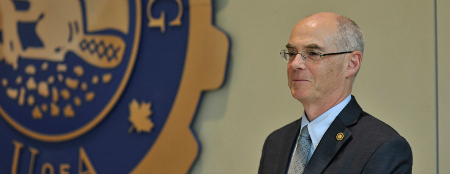
Fraser Forbes has been appointed to a five-year term as UAlberta Dean of Engineering.
The announcement comes nearly a year after Forbes was appointed as interim dean, as the faculty was moving into a new building and laying the groundwork for new educational initiatives.
"It has been an amazing year, and we've met or exceeded all of our goals," said Forbes. "This is Canada's finest engineering school, and it is a privilege and honour to be selected as dean."
Forbes ensured during the past year that the Faculty of Engineering didn't pause in pursuit of its goals-and he'll continue moving the faculty forward.
"During the next five years our focus will be on maintaining and, where possible, accelerating our momentum, hiring the highest-quality people, providing the highest-quality spaces to students and researchers, and continuing our long history of exceptional teaching and research programs," he said.
"We're going to focus on reigniting a culture of innovation and entrepreneurship in our students, and creating innovative new educational programs for undergraduate and graduate students, and for professionals," he said. "Our ambition is to create programs and partner-ships with other faculties to the benefit of all University of Alberta students."
Steven Dew, U of A provost and vice-president (academic), says Forbes, who arrived at the university 20 years ago, has expertise in teaching, research and governance-including serving on the U of A's Chairs Council Executive and the President's Advisory Council of Chairs-that uniquely qualifies him for the dean's position.
"Fraser's focus on excellence in teaching and research, and his accomplishments as department chair and member of the university governance community, have had a strong impact on the University of Alberta," said Dew. "His leadership will undoubtedly move the U of A and the Faculty of Engineering forward-we congratulate Fraser and welcome him to his new role as dean of engineering."
Forbes was appointed chair of the Department of Chemical and Materials Engineering in July 2002. Under his guidance, the department has seen a number of successes, including the completion of three newly renovated floors of the CME building (which have been awarded LEED Gold standing); the establishment of a Canada Excellence Research Chair in Oil Sands Molecular Engineering, seven new Canada Research Chairs, five new NSERC Industrial Research Chairs and the renewal of four NSERC Industrial Research Chairs; the creation of a Campus Alberta Innovates Program Research Chair in Polymer Engineering for Oil Sands Processing; and the formation of three large research centres: the Imperial Oil Institute for Oil Sands Innovation, the Canadian Centre for Clean Coal/Carbon and Mineral Processing Technologies, and the Alberta Centre for Surface Engineering and Science. He has supervised the hiring of 39 faculty members. During his tenure as chair, the department experienced graduate student enrolment growth of over 250 per cent, along with a 200 per cent increase in undergraduate materials engineering students and more than 50 per cent growth in enrolment of undergraduate chemical engineering students.
As an educational leader, Forbes has a strong record of nurturing and empowering professors to continuously improve their effectiveness in the classroom, leading teams that have been awarded numerous prestigious teaching awards.
In teaching and learning, Forbes has supervised 30 master's and 14 PhD theses. He created or completely revised three undergraduate courses and one graduate chemical engineering course. He led the chemical engineering curriculum revision committee, drove the first major revision of the materials engineering undergraduate program in several decades, and ushered in new biomedical and nanotechnology options.
He earned his bachelor's and master's degrees in chemical engineering at the University of Waterloo and his PhD at McMaster University. Professionally, he worked as a process automation engineer with Dofasco Inc. from 1987-89, and from 1983-2005 was a principal of Forbes-Barry Inc. as a consultant. In that capacity, his services covered a wide range of operations in the steel, petrochemical, forest products and agriculture/food industries.
Forbes' research is broadly based around the optimization of industrial operations, and his re-search findings have resulted in more than 145 refereed publications. As a principal investigator, his research projects have been awarded more than $2 million and he has been co-investigator on projects that have received more than $1.5 million in research funding.
Looking forward, Forbes says the Faculty of Engineering is developing exciting new opportunities for students and professionals, noting that the faculty is positioned for marvellous accomplishment thanks to the work of former dean David Lynch."Over the past two decades, we have laid the foundation of our future success. In the next decade, we will build upon that tremendous foundation to emerge as Canada's leading Faculty of Engineering and one of North America's very finest."